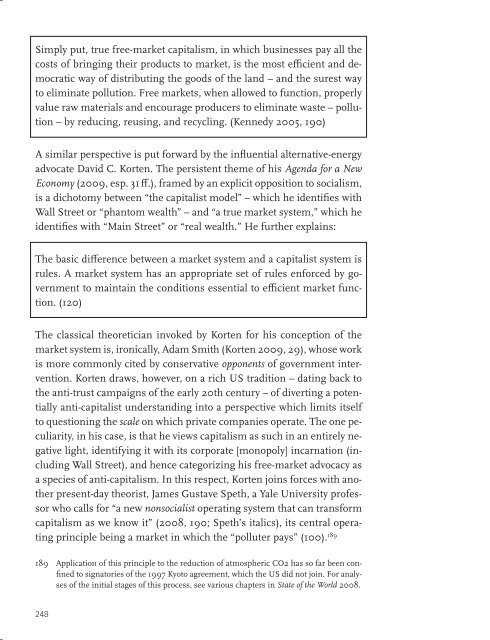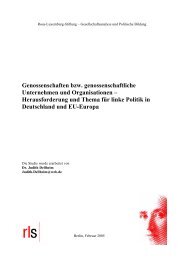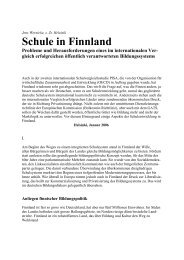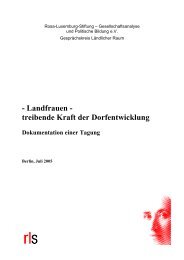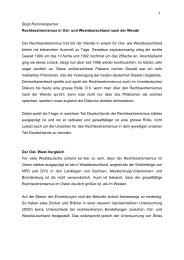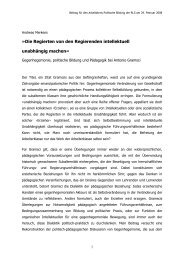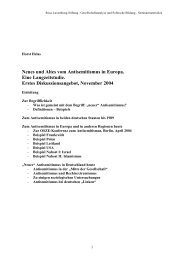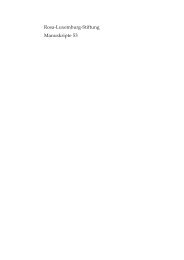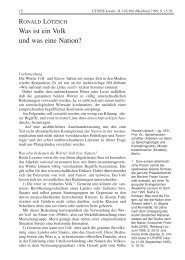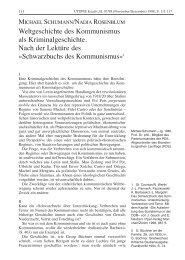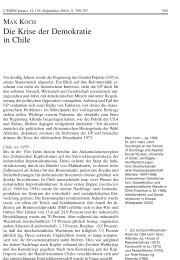Grünen Kapitalismus - Rosa-Luxemburg-Stiftung
Grünen Kapitalismus - Rosa-Luxemburg-Stiftung
Grünen Kapitalismus - Rosa-Luxemburg-Stiftung
Erfolgreiche ePaper selbst erstellen
Machen Sie aus Ihren PDF Publikationen ein blätterbares Flipbook mit unserer einzigartigen Google optimierten e-Paper Software.
Simply put, true free-market capitalism, in which businesses pay all the<br />
costs of bringing their products to market, is the most efficient and democratic<br />
way of distributing the goods of the land – and the surest way<br />
to eliminate pollution. Free markets, when allowed to function, properly<br />
value raw materials and encourage producers to eliminate waste – pollution<br />
– by reducing, reusing, and recycling. (Kennedy 2005, 190)<br />
A similar perspective is put forward by the influential alternative-energy<br />
advocate David C. Korten. The persistent theme of his Agenda for a New<br />
Economy (2009, esp. 31 ff.), framed by an explicit opposition to socialism,<br />
is a dichotomy between “the capitalist model” – which he identifies with<br />
Wall Street or “phantom wealth” – and “a true market system,” which he<br />
identifies with “Main Street” or “real wealth.” He further explains:<br />
The basic difference between a market system and a capitalist system is<br />
rules. A market system has an appropriate set of rules enforced by government<br />
to maintain the conditions essential to efficient market function.<br />
(120)<br />
The classical theoretician invoked by Korten for his conception of the<br />
market system is, ironically, Adam Smith (Korten 2009, 29), whose work<br />
is more commonly cited by conservative opponents of government intervention.<br />
Korten draws, however, on a rich US tradition – dating back to<br />
the anti-trust campaigns of the early 20th century – of diverting a potentially<br />
anti-capitalist understanding into a perspective which limits itself<br />
to questioning the scale on which private companies operate. The one peculiarity,<br />
in his case, is that he views capitalism as such in an entirely negative<br />
light, identifying it with its corporate [monopoly] incarnation (including<br />
Wall Street), and hence categorizing his free-market advocacy as<br />
a species of anti-capitalism. In this respect, Korten joins forces with another<br />
present-day theorist, James Gustave Speth, a Yale University professor<br />
who calls for “a new nonsocialist operating system that can transform<br />
capitalism as we know it” (2008, 190; Speth’s italics), its central operating<br />
principle being a market in which the “polluter pays” (100). 189<br />
189 Application of this principle to the reduction of atmospheric CO2 has so far been confined<br />
to signatories of the 1997 Kyoto agreement, which the US did not join. For analyses<br />
of the initial stages of this process, see various chapters in State of the World 2008.<br />
248


